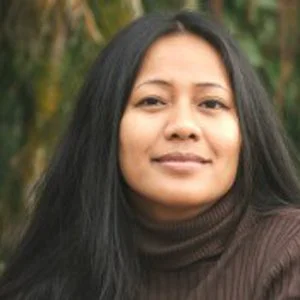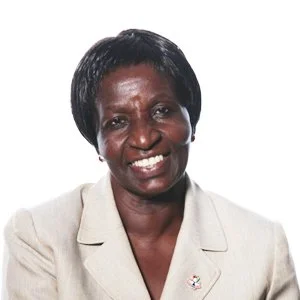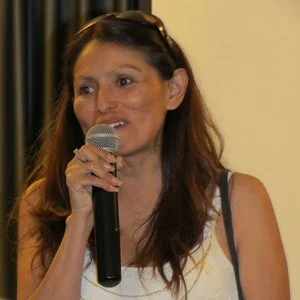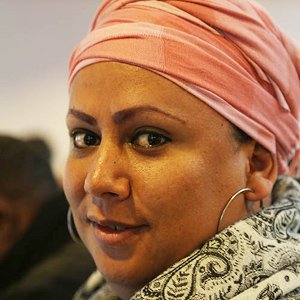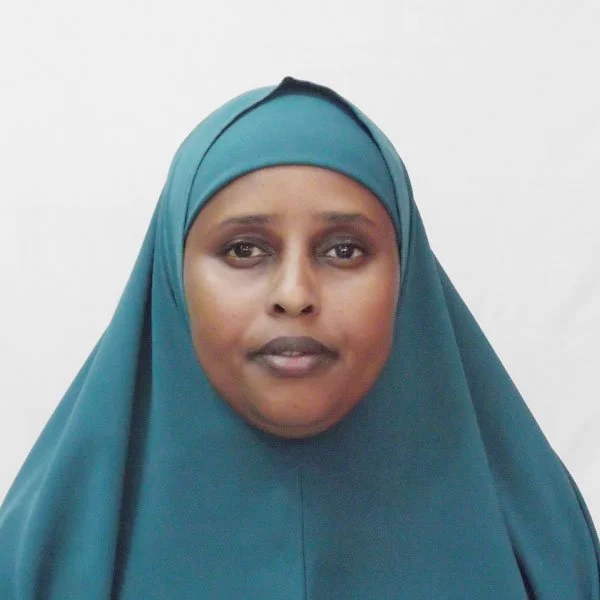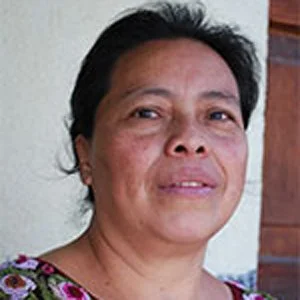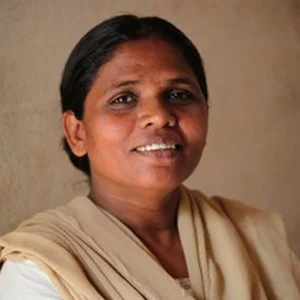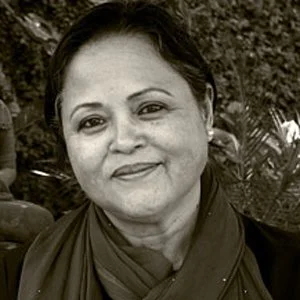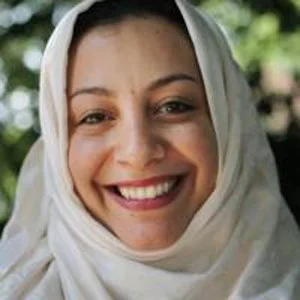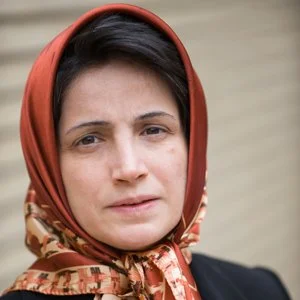2016
THE WOMEN HAVE WINGS AWARDS
Binalakshmi Nepram
India
Binalakshmi Nepram is a dynamic and courageous activist, writer and advocate for promoting peace through arms reduction and is working towards a disarmament movement in India. She belongs to Manipur state in the Northeast Region, where insurgency and armed conflict has been rampant for more than 40 years. Life in Manipur state is precarious. Multiple layers and actors of violence include insurgents, warring tribes, paramilitary, army and the police – each with their own agendas. For civilians, day-to-day living is fragile with crossfires.
Binalakshmi grew up in this crossfire and lost her very young niece and nearly her parents. This became a turning point for her to mobilize women for the first ever ‘Women Gun Survivors Network’ in the country and advocate for arms control. Through this Network, Binalakshmi works in 300 villages in two North Eastern states and is in the process of expanding the work to other states. The Network enables women survivors with their socio-economic and legal rights, provides psychosocial counseling, facilitates income earning opportunities, children’s schooling and helps them to live with courage and dignity. Women’s leadership is nurtured and advanced through the Network to become agents of change and ensure access to justice for their sisters who survive gun violence.
The Control Arms Foundation, that Binalakshmi co-founded, works to restrict sale of guns and weapons. India is the second country after United States in terms of number of weapons owned by civilians. Through the Foundation’s advocacy, the licensing system of civilian weapon ownership in Delhi State has changed to include women’s consent for men who buy arms as a deterrent (99.9% of civilian gun owners in India are men). This model is now being advocated for the rest of India. Binalaksmi has been instrumental in spearheading this procedure. She also leads the Foundation for using evidence-based advocacy to make a case against ‘weaponizing’ the society. For example, 12 Indians are killed every day due to small arms and 5000 Indian die every year due gun violence.
Binalakshmi has published several articles and written a book and is one of the recipient of the “Indian of the Year Award” for Special Achievement by the CNN-IBN.
Ruth Ojiambo Ochieng
Uganda
Ruth Ojiambo Ochieng has been involved for many years in international women’s rights efforts and most recently in the International Campaign to Stop Rape & Gender Violence in Conflict. Ruth has worked for over two decades to advance women’s rights and promote peace and security across Africa—building vibrant support networks of women activists across borders.
As the Executive Director of Isis-WICCE (Women’s Cross-Cultural Exchange), she promoted women’s leadership and has documented women’s experiences of armed conflict in Uganda, Liberia, Nepal and South Sudan. She herself had experienced the trauma of armed conflict in her home country of Uganda and has since dedicated her life to working with women who been victims of conflict to become leaders in their communities. With her team at Isis-WICCE, Ruth provided holistic medical, psychological, and social support to survivors of sexual violence in Uganda and documented their stories. Through the power of storytelling, she gave a voice to those who have traditionally been unheard. Although she has recently retired from her position in Isis-WICCE, she continues to work on giving voice to African women.
Ruth also played a key role in the development of a Ugandan women’s peace coalition that successfully mobilized women to intervene in peace talks between Uganda’s government and the Lord’s Resistance Army. After the collapse of the Ugandan peace agreement, Ruth helped mobilize women to review and support the development of the Uganda Government Framework on Peace and Recovery Development Plan: essential action to bring women’s voices into the peace process. Ruth has also contributed to several global policy groups, including the high level independent panel reviewing UN Security Council Resolution 1325.
Ana Luz Mamani Silva
Peru
Ana Luz Mamani Silva is a sex worker from Arequipa in Southern Peru who together with colleagues founded an organization to fight for the human and labour rights of sex workers: Asociación de Trabajadoras Sexuales Mujeres del Sur (Sex Worker Association Women of the South). Sex work is not criminalized in Peru, but sex workers nevertheless experience a lot of violence and stigma. Ana Luz realized that many sex workers because of social pressure think that they deserve the violence, discrimination and exclusion that comes with their job. She found this profoundly unjust and she and colleagues formed their organization to support each other and to fight for the rights of sex workers. Ana Luz and her organization demand respect of sex work as work, good labour conditions for sex workers, proper protection and support in case of violence, and inclusion of sex workers in decision- making for issues that involve them, such as health and safety regulations.
They are active in Arequipa and several surrounding communities. Ana Luz and the organization have become a trusted partner to civil society organizations and the local authorities, overcoming the discrimination (often on moral grounds) against them because they are sex workers. Because of Ana Luz’s pioneering activism and her stepping out in the open as one of the first sex workers from her community, more women in sex work are now able to voice their concerns and demands. This means that sex workers can take part in discussions and decisions that affect them, honoring actively their principle of ‘nothing about us without us’.
Leigh Ann van der Merwe
South Africa
Leigh Ann van der Merwe is a passionate and determined African trans feminist who is committed to fighting for a world where there is justice and equality for all women. She is the founder and Coordinator of S.H.E., a feminist collective of trans and intersex women which works to build an African trans feminist movement through feminist leadership development, and by building relationships with women’s and trans’ rights organizations across the continent. Working in a context where trans women are highly stigmatized and face violence from a transphobic community, Ms. van der Merwe commitment to raising the visibility of trans women’s issues and ensuring their rights are protected and fulfilled makes her a fearless leader of the African trans feminist movement.
Ms. van der Merwe is committed to building close links between the feminist and the trans movements. Under her leadership, S.H.E organized the African Transformative Feminist Leadership Institute as a way of bringing together trans women and activists to deliberate on the issues affecting trans women on the continent from within a feminist perspective. At the institute, trans feminists drew up and The Institute provided a space for trans feminists to craft the African Transgender Feminist Charter which stipulates the values of the movement as well as guide the work to be done on human rights issues for trans* women. This charter is a significant step forward in articulating a shared vision and agenda for the African trans* movement as it stipulates three distinct areas of work to be undertaken by the movement: community mobilization and advocacy, human rights and legal advocacy, feminist and alliance building, as well as describing the values that bind the movement together.
Ms. van der Merwe is also committed to building a cadre of transformative trans feminist leaders across Africa. To do this, S.H.E. runs an internship program where they provide opportunities for trans feminists from other countries in Africa to work with S.H.E. and gain valuable skills needed to for daily work in non-governmental organizations. Given that one of the biggest challenges trans people identify is an ability to find employment opportunities, this internship provides a space for trans feminists to gain some work experience and the needed skills to compete in a tough job market.
Fatuma Kinsi Abbas
Kenya
Fatuma Kinsi Abbas leads the Pastoralist Girls Initiative (PGI), a Kenyan group which works with Somali girls and women living in the Garissa county of Kenya. Since the beginning of its activities in 2001, PGI, under the leadership of Mrs. Abbas, has been organizing and empowering Somali girls and women to become visible, confront and stop violence against women and girls, and challenge traditions that relegate them at the margins of their communities.
Women and girls living in the Garissa county experience discrimination in accessing education and are excluded from decision-making structures, both traditional and formal. Girls are particularly exposed to violations of their rights, including early marriages, female genital mutilation, and sexual violence.
It is in this context that PGI, under the inspiring leadership of Mrs. Abbas, has supported girls in taking their own lives in their hands and claiming their rights. Mrs. Abbas’ work has been so successful that in 2012 some of the girls who took part in PGI’s activities decided to create a girls-led organization, the INUA Association, the first and only girls-led organization in the Somali area of Kenya. Mrs. Abbas’ has also been able to mobilize women in Garissa, getting them organized to access and take active part in local decision-making structures, and facilitating their political exchange with traditional and local leaders, as well as the intergenerational exchange with the girls reached through PGI’s work in schools. Mrs. Abbas is an outstanding and experienced activist who has dedicated her life to advancing girls and women’s rights in Garissa.
Leticia Toj Umil De Méndez
Guatemala
Leticia Toj Umil De Méndez is the Executive Director of Rxiin Tnamet, a local community health organization in Guatemala. An incredible leader who has been working in community health for 30 years. She was discriminated against both for being a woman and for being indigenous. Nevertheless, she remained determined to work to ensure communities’ improved access to health services. Due to the problems and dangers during the Civil War, Leticia moved to Quetzaltenango where she graduated as a professional nurse in 1984. The following year, she moved to Santiago Atitlan to be the chief nurse in the Hospital Santiaguito run by Project Concern International. Recognizing the great necessity of the community, she began a project, working with the community in education and prevention regarding maternal infant health. When Project Concern International had to leave Santiago for lack of funding, she was one of the founders of the new Health and Development Association Rxiin Tnamet and has held the position of executive director since then. Despite the many challenges and countless obstacles faced by trying to establish a women’s organization in rural Guatemala, under her leadership, Rxiin Tnamet has become the most important community health center for the women in Santiago Atitlan. Lety has been integral to the organization’s growth and development, always proud of her roots and culture yet also unafraid to resist tradition in support of women’s rights. She has armed a team of young leaders of indigenous descent to provide community services and has been a mentor to other nurses since she graduated (some of whom have gone to work in the Ministry of Health). Lety’s leadership has been recognized on several occasions and she has been invited to represent indigenous women of Guatemala and share her expertise at several international programs and conferences.
In Guatemala, there are stark differences between the development indicators of indigenous and non-indigenous communities. Despite the great need for urgent action to improve the conditions of indigenous women who are especially marginalized members of society, there is a lack both of political will and budget to improve social services available to those communities and existing social services are many times inadequate due to their lack of cultural relevance. It was in this context that Lety first began working in community health and established Rxiin Tnamet. Rxiin Tnamet (“of the people”) was formed to improve women and children’s health and respond to the needs of women in the community, largely indigenous women, of Mayan, Tzutujil and K’iche’ origin. Rxiin Tnamet provides direct health services through two community health clinics. The clinics employ Mayan health professionals, all women, who are proud of their culture and can approach the problems of their community with care and sensitivity. Despite the culturally conservative traditions of the Tzutujil people, the clinic has worked to implement projects for the reproductive rights of women, youth, and teenagers and has mobilized to achieve greater political incidence to improve the lives of women in the aftermath of armed conflict. They provide services such as prenatal care, family planning, pediatrics, dental care, pharmacies, and laboratory services. The group runs a rural women’s community health education program with a women’s human rights perspective, as well as training NGOs on preventive health. The Association has conducted research on women’s reproductive health, HIV/AIDS, and sexual education for young people, among other topics. Rxiin Tnamet has created a system of community health management for the largely illiterate, non-Spanish speaking population in 21 villages around Santiago Atitlán. Through community development initiatives, the organization provides funding and health management training to other community groups in the region.
Anuradha Bhosale
India
Anuradha Bhosale is a renowned grassroots women’s rights and anti-child labor activist based in the Kolhapur district, Maharashtra, India where more than 35,000 children are involved in daily labor for local industries. A former child-laborer herself at the age of six, she has spent the past 20 years fighting for the prevention of child exploitation, labor, trafficking, and female infanticide. Despite being explicitly defined as unlawful in the constitution, child labor is deeply ingrained in Indian culture. It takes a very unique breed of courage to undertake changing an element of society that has become an institution.
In attempt to dismantle child labor practices, Anuradha began with a bold, three-pronged approach that involved whistle-blowing on the brick kiln managers who employ children, rescuing the children outright, and pressing government officials to follow through on their civic duty to uphold the human rights outlined the constitution. She held peaceful demonstrations, “created a lot of noise,” and made sure the local media were there to capture the story. Coming from the untouchable class herself, it was not surprising, that she was threatened every step of the way.
As director of AVANI organization, Anuradha has facilitated the rescue of 341 child laborers, provided 5,604 migrant children the right to health care and education, organized the construction of schools directly inside the brickyards and established a residential home for at-risk migrant children. From the beginning, Anuradha recognized that child-labor was a cyclical phenomena oftentimes beginning with women in vulnerable positions. Searching for longer-term solutions to the root of the issues surrounding child labor, she founded the Women and Child Rights Campaign (WCRC), devoted to educating and empowering widowed, divorced and abandoned women–those at the greatest risk of sending their children into the workforce out of necessity.
Working at the grassroots level organizing meetings in rural villages, Anuradha drives change by providing marginalized rural women and children access to information regarding their legal civil rights. She motivates them to unite, do for themselves, pursue education and act on their own issues.
In 2010, Anuradha trained 3,741 widows, divorced and abandoned women to petition and peacefully protest to receive the government entitlements due to them. She was successful in achieving this, thus reducing the need for women to send their children into the workforce. While Anuradha Bhosale is visibly at the helm of the women’s right and anti child labor cause in her region, her message will always be rooted in the belief that long-term change and growth can only be accomplished by encouraging people to educate and do for themselves. Now empowered and motivated to unite on their own, rural women have continued to hold regular village meetings relating their rights. Anuradha has always spoken of her work as the building of a movement— instilling hope and courage for women to act on their own behalf is at the core of her life’s work.
Rita Thapa
Nepal
Rita Thapa is paving a path for a new generation of NGO feminist leaders, peace activists, gender justice advocates, and social philanthropists. Rita’s huge heart and benevolence for all humanity maps her road as she inspires people worldwide to donate time, money and energy. Projects are approached with great love, inspired ideas, innate grace and erudite wisdom. As an international development consultant, thousands of people cross my path annually. No one has impacted my life or the lives of others like Rita Thapa. Like a beacon of light, she stands above the crowd, all the while working directly at the grassroots level for the betterment of the community in very a challenging environment.
Two critical issues persist in Nepal today. The first issue is the aftermath of the April 25, 2015 earthquake, and second is the ongoing fragility of peace processes complicated by the unstable, corrupt Maoist government. To say that Rita Thapa is courageous is a major understatement. In a deeply-embedded patriarchal society, she was a widow expected to stay home with three young children when she launched Tewa some 20 years ago on the heels of the 1995 4th U.N. Conference on Women in Beijing. Yes, we were both there. Twenty years later, Tewa has grown into a global model for feminist institutions, appropriate infrastructure/safe space for women and girls, women’s rights philanthropy, and gender justice.
To firmly accelerate the Tewa Center, eleven years ago, she assumed an implausible gamble. Rita worried as the Nepal central bank interest dropped phenomenally due to the armed conflict in Nepal. With enormous financial and institutional risk, and yet with an eye on sustainability, she led the Tewa Executive Board to invest the existing 17.02 million rupees endowment fund in a TL&BDP (Tewa Land & Building Development Project). The TL&BDP grew by adding various infrastructures, raising money, and conducting time bound campaigns. In these ways it managed to build Upahaar – an arcade of shops on its eastern boundary, Tewa- the Tewa office building, Santoshi– the cafeteria, Rangamanch – the open-air theatre, Jamghat – the covered hall, and Aadhar – the office block. The intention is that the Tewa Center will not only generate revenue, but will also create cash flow for Tewa’s future. And is Rita done yet? Not with a breath in her body. A few months ago, she announced a new infrastructure plan for another girl’s dormitory, Aanandi 3.
Features of Rita’s work threaded throughout Tewa, Nagarik Aawaz and her other NGOs are the attributes of feminist leadership and her strong self-designed archetypes of sustainable development, not commonly practiced in Nepal or elsewhere in the world for that matter. Rita founded her NGOs according to democratic and feminist principles, thereby creating forums where diverse individuals can come together in solidarity under non-hierarchical, non- bureaucratic structures and in environments where transparency, accountability, respect and trust are of utmost importance and are rigorously upheld.
Rita’s personal and professional qualities include her ability to easily, effortlessly cross, and collaborate with, all sectors of life from grassroots organization in villages to top political levels. Rita ceaselessly demonstrates how strong women can be when they support and inspire one another. Rita’s success would not be possible without her wonderful personal features: her respect of all cultures, her high spirit and centeredness, her optimism and positive attitude, as well as her patience, creativity, natural charisma, and relentless courage to change the status quo.
Rasha Jarhum
Yemen
Rasha Jarhum is a gender rights advocate in Yemen and the Founder of Yemeni Youth for Humanitarian Relief. Yemeni Youth for Humanitarian Relief (YYHR) is a youth lead initiative to facilitate a rapid response to humanitarian crisis and relief Yemeni families from any man-made or natural disasters. A regional media and advocacy officer for Oxfam in Beirut, she has been working on the Syria crisis and refugee policy, including amplifying voices of refugees. Jarhum is a program development advisor for House of Ideas, a youth led NGO she co-founded and a researcher with American University of Beirut. From 2012 to 2015 she was a social research consultant for the United Nations. Jarhum is a member of the Yemeni Women’s Pact for Peace and Security and an Aspen Institute New Voices Fellow.
The complex political and security situation in Yemen has an outfall on more than what is broadcasted on TV, there are social and humanitarian consequences to the ongoing turmoil, including injuries, deaths, livelihoods lost, displacement of people and more. From this standpoint, a number of youth groups across the country have come together in solidarity with the humanitarian consequences, working together to raise resources, work with families and children, and provide the needed medical care, food, and non-food emergency items needed by families which are directly affected by the ongoing unrest.
On February 16th-25th 2011, Aden protesters were brutally attacked by security forces (HRW Report), as such this group was created. The situation in Aden was very an alarming; from a humanitarian perspective, especially as the unrest continues, hospitals were short on many types of equipment and many people do not have money needed to purchase the needed emergency and healthcare items, and even if they did, that came out of their food and well-being budget for their families. The group was first established on Facebook group to support and organize medical support for Aden citizens only who were injured during protests. Days later, the group decided to widen their operation to include Yemen nationwide.
Today YYHR includes more than 60 boys and girls and works in close coordination with other initiatives. Initially there was focus on members who are politically independent but with time the group’s management realized that there are those active sincere Yemenis who may be affiliated to political parties but are interested in relief and humanitarian work. So they decided to be inclusive while still maintaining the neutrality of them as an initiative and focusing on non-political activities.
The interesting fact of this initiative is that it includes both men and women who work in a cohesive environment despite the Yemeni traditions that usually do not allow such freedom of mixed gathering. “The society is made of men and women so naturally a successful organization would be made the same way. We never faced any problems working together because we are serious in what we do,” said Al-Rawhani.
Nasrin Sotoudeh
Iran
Nasrin Sotoudeh has represented prisoners of conscience, Iranian opposition activists and politicians, journalists, abused children and mothers working to protect their abused children from being returned to their abusive fathers, and prisoners sentenced to death for crimes committed when they were minors. She has also highlighted the execution of juveniles and Iran’s high rate of executions. Her clients have included Heshmat Tabarzadi – the head of the banned opposition group Democratic Front of Iran, and activists and journalists Isa Saharkhiz, Nahid Keshavarz, Parvin Ardalan, Omid Memarian and Roya Tolouie including cases following the disputed June 2009 Iranian presidential elections. She has also worked closely with Nobel Peace Prize Laureate Shirin Ebadi and her Defenders of Human Rights Center.
Nasrin was arrested in September 2010 and imprisoned in solitary confinement in Evin Prison on charges of spreading propaganda against the system, conspiring to harm state security, misusing her profession as a lawyer, and belonging to an “illegal” organization, the Defenders of Human Rights Center. Nasrin has denied all the charges against her. Activists and campaigners say the charges against her were trumped-up, fabricated because of her human rights activities, for which she is recognized internationally. Nasrine’s arrest is also believed to be linked to her representation of Shirin Ebadi, a colleague and Iranian Nobel Peace Laureate currently living in exile.
Following Nasrin’s arrest, Shirin called for her release and expressed concern regarding her health. In the statement, Shirin said, “Ms. Sotoudeh is one of the last remaining courageous human rights lawyers who has accepted all risks for defending the victims of human rights violations in Iran”. Nasrin’s imprisonment is widely condemned in the international community. International lawyers, movie directors and politicians — among them Secretary of State Hillary Rodham Clinton — have called on Iran to set her free. Former Czech President Vaclav Havel and Zahra Rahnavard, the wife of opposition leader Mir-Hossein Mousavi, have also called for her release. Amnesty International launched an urgent call for her release, designating her a prisoner of conscience and noting that she was “at risk of torture or other ill-treatment”. The US condemned what it called the “unjust and harsh verdict” against Nasrin, who it called “a strong voice for rule of law and justice in Iran.
In October 2010, the International Campaign for Human Rights in Iran, Human Rights Watch, the International Commission of Jurists, the International Federation for Human Rights, the Iranian League for the Defence of Human Rights, the Union Internationale des Avocats and the World Organisation Against Torture joined Amnesty International in a joint statement denouncing Sotoudeh’s arrest and calling for her immediate release. In January 2011, the Law Society of England and Wales also issued a call for her release. European Union High Representative of the Union for Foreign Affairs and Security Policy Catherine Ashton stated, “I am following the case of Nasrin Sotoudeh and other human rights defenders with great concern … We will continue to campaign for the charges against them to be dropped. We look to Iran to respect the human rights obligations it has signed up to”.
In January 2011, Iranian authorities sentenced Nasrin to 11 years in prison, in addition to barring her from practicing law and from leaving the country for 20 years. An appeals court later reduced Nasrin’s prison sentence to six years, and her ban from working as a lawyer to ten years. While in prison, Nasrin lost both her parents. She was not allowed to attend the funeral of her father who died two weeks after she was arrested, but she did attend her mother’s burial ceremony for a few hours in December 2012. Nasrin’s husband, Reza Khandan, and her 13-year-old daughter, Mehraveh, have also been subject to harassment by the Iranian officials. Khandan and Mehraveh were both summoned to the court and barred from leaving the country.
While in jail, Nasrin repeatedly has gone on hunger strikes in protest at her arrest and at being deprived of her rights and her family’s rights including access to her lawyer and family. One hunger strike was four weeks long and another was 49 days. She only ended the second following a short visit of some parliament members where they acknowledged and implemented her requests on lifting her daughter’s travel ban. Nasrin has repeatedly been denied visits from her children in jail, including once for refusing to wear a chador, the full-length cloak worn by Iranian women. “I know that you require water, food, housing, a family, parents, love, and visits with your mother,” she wrote to her children in a letter from jail, according to the opposition website persian2english.com. “However, just as much, you need freedom, social security, the rule of law, and justice.”
In January 2013, she was temporarily released for three days on production of a hefty bail, after more than two years in jail. The release is provided for under Iranian law. Amnesty International welcomed the news of Nasrin’s temporary release, but said: “Nasrin shouldn’t have been imprisoned in the first place”. Amnesty International has long campaigned for Nasrin’s unconditional release as a prisoner of conscience, as she was jailed solely for her peaceful work as a human rights lawyer. They stated that vaguely worded charges like those against Nasrin do not amount to recognizably criminal offences, but they commonly lead to the imprisonment of prisoners of conscience.
Her release was unexpectedly curtailed, as it had been anticipated that it would be extended. A spokeswoman for the Security Committee of the Iranian Parliament’s National Security and Foreign Policy Commission said that a number of its members took part in an inspection of Evin Prison on 21 January. Shortly after they left, Nasrin was summoned back to prison. Khandan told Amnesty International that her prompt return had come as a surprise, and he plans on writing to parliamentarians to raise concerns that her release may simply have been a pretext for ensuring she was absent when the inspection took place. The authorities had indicated to us that her release would be more than three days. It was totally unexpected [that she would return so soon]…and when we took her back to Evin Prison, outside the gate, the children wept – it was so hard on both of them,” said Khandan.
When Amnesty International heard of her return to prison, they said “Nasrin Sotoudeh, whose human rights work has been recognized internationally, including when she was awarded the EU’s Sakharov Prize last year, is a prisoner of conscience who must be released immediately, unconditionally and for good. Nasrin Sotoudeh’s three-day release was merely a cruel charade and illustrates how little respect the Iranian authorities have for their international human rights obligations. It is becoming increasingly common for the Iranian authorities to use the denial of access to family visits as a form of punishment for imprisoned human rights defenders. Children of prisoners are often deeply affected by the absence of a parent and denial of family visits only compounds their distress,” said Amnesty International.
Before her recent three-day release – and brief reunification with her husband and two children, aged 13 and four – Nasrin had been regularly prevented from having face-to-face meetings with her husband Reza Khandan and their two young children since her imprisonment in 2010. She was also frequently prevented from speaking with her family. The Iranian authorities have also harassed or taken punitive measures against her family members. On one occasion her husband was detained overnight for his peaceful advocacy to secure his wife’s release. The authorities also placed an illegal travel ban on their 13-year-old daughter, which prompted Nasrin to stage a 49-day hunger strike in prison late last year. She decided to go on this hunger strike out of fear of increasing limitations imposed on her family. She fell into fragile health during the hunger strike, in which she would drink only water mixed with salts and sugar. Her weight dropped to 95 pounds.

